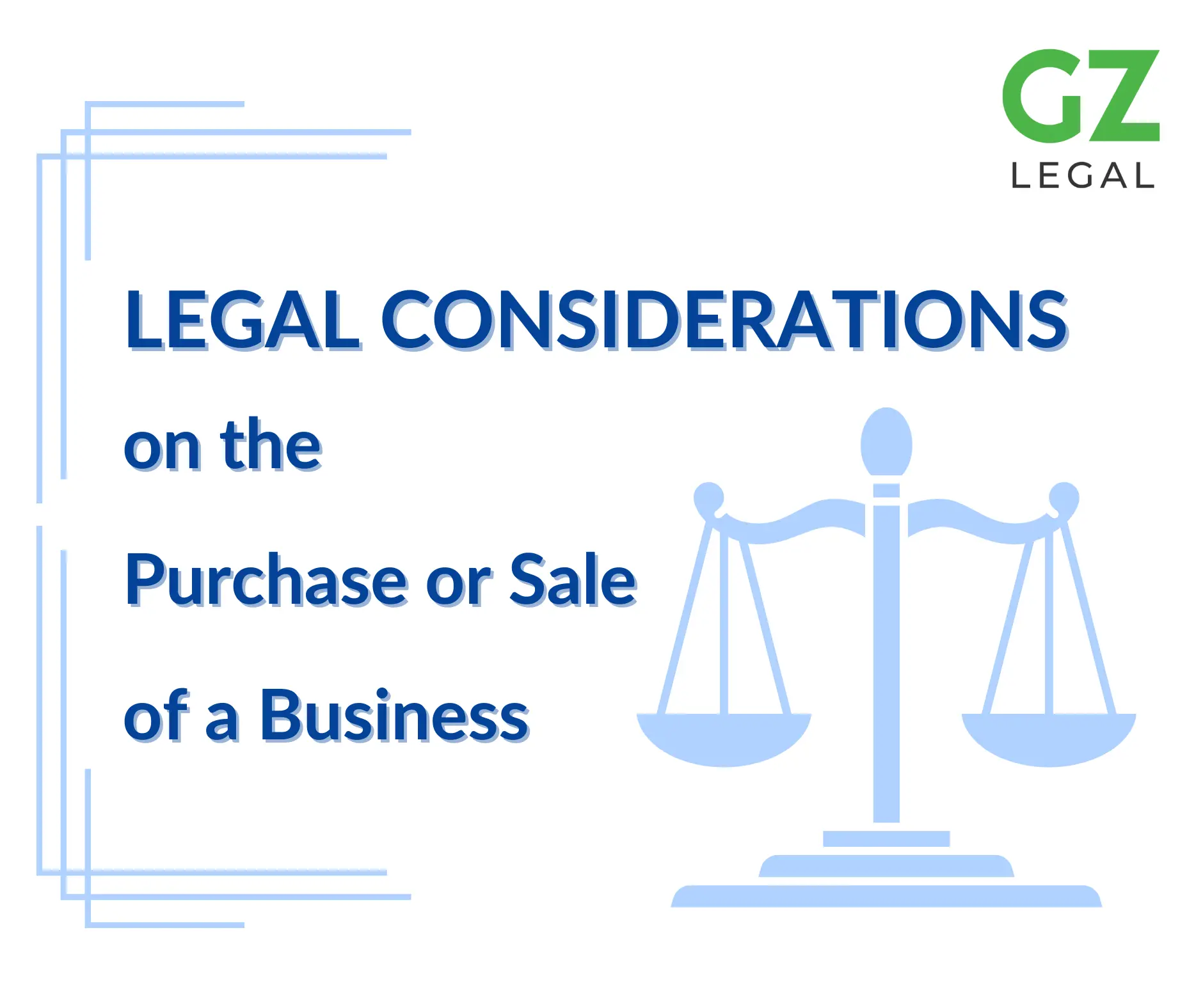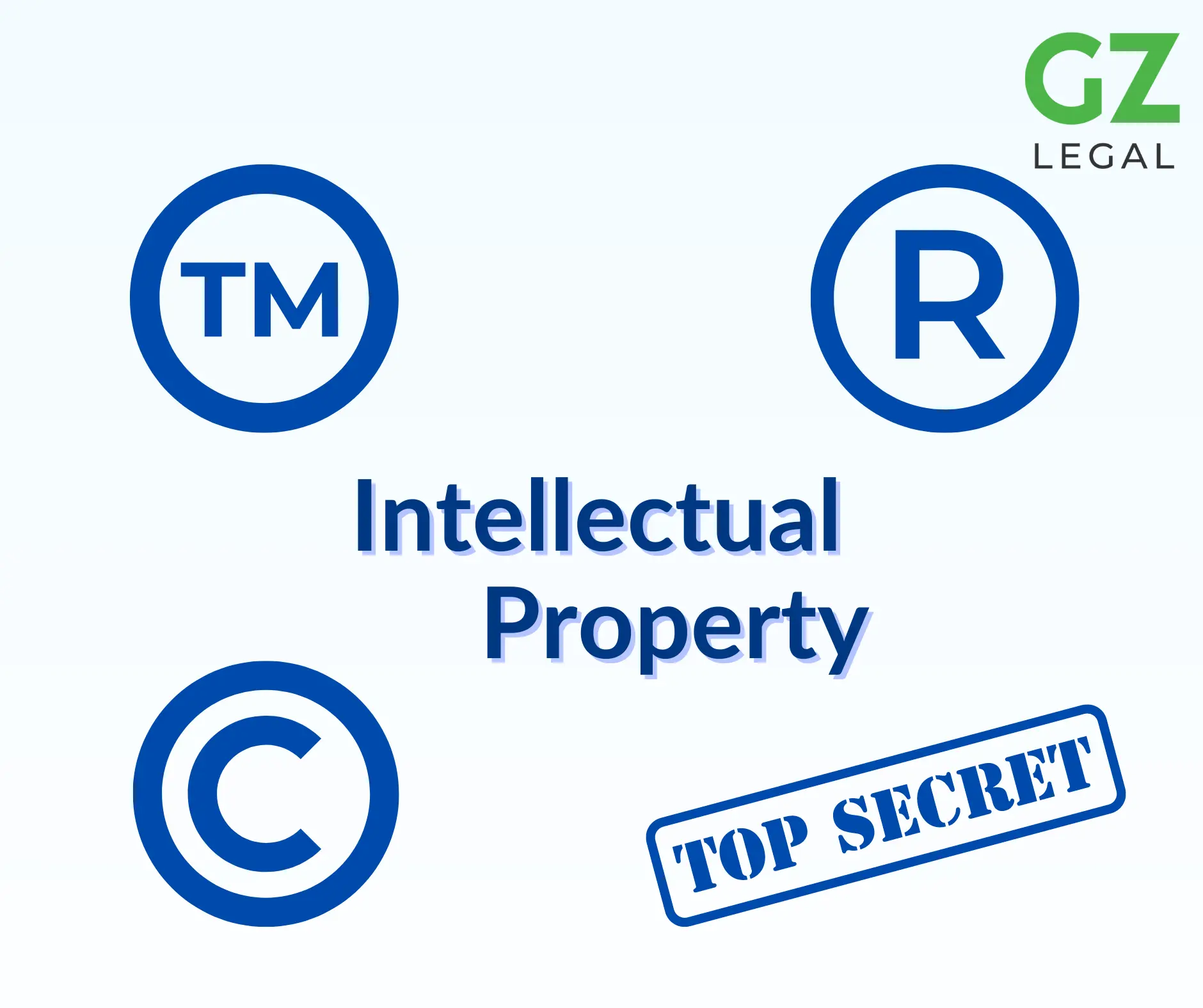Malcolm ZoppiSun Oct 15 2023
Legal Considerations on the Purchase or Sale of a Business
Buying or selling a business can daunting. In this blog, we’ll cover some of the key considerations you should consider!

Entering into a business transaction, whether buying or selling, requires thorough attention to legal matters for a smooth process. Legal considerations play a critical role in safeguarding your rights and interests and ensuring a fair deal. This article aims to explore the various elements of legal considerations when purchasing or selling a business, outlining key principles and guidelines that ought to be followed by both parties.
Understanding preliminary steps, structuring the transaction, and the negotiation phase forms the foundation of any business sale or purchase. Equally important is drafting a comprehensive purchase agreement that encapsulates all relevant aspects of the deal. Issues pertaining to intellectual property, employment law, regulatory compliance, and other legal considerations in business sales must also be carefully examined to mitigate risks and avoid potential disputes.
Key Takeaways
- Legal matters are crucial in a business purchase or selling, protecting rights and ensuring fairness.
- Purchase agreements encompass terms, price, and conditions; adhering to employment law and regulatory compliance is necessary.
- Intellectual property, other legal factors, and post-closing matters contribute to a successful transaction.
Preliminary Steps
Before diving into the legal considerations of buying or selling a business, it is crucial to understand the preliminary steps that set the stage for a successful transaction. In this section, we will cover the importance of the Heads of Terms, choosing the right lawyer, and conducting due diligence.
Heads of Terms
The Heads of Terms is a vital document in the process of buying or selling a business. It is a written agreement between the buyer and seller, outlining the main terms and conditions of the proposed transaction. This document is (mostly) non-binding but serves as a foundation for negotiations and drafting a legally binding purchase agreement. Key components of a Heads of Terms may include:
- Valuation: The agreed-upon price or valuation range of the company.
- Payment Terms: How the purchase price will be structured and paid.
- Assets and Liabilities: A description of the assets and liabilities to be included in or excluded from the transaction.
- Completion Date: A tentative date for closing the transaction.
- Exclusivity: A period during which the seller cannot negotiate with other potential buyers.
Choosing the Right Lawyer
Having the right lawyer to assist in the transaction is crucial for both the buyer and seller. Here are some key factors to consider when choosing a lawyer:
- Expertise: Look for a lawyer with experience in mergers and acquisitions, and a strong understanding of the specific industry involved.
- Reputation: A lawyer with a positive reputation and good references can help ensure a smooth transaction process.
- Location: It may be beneficial to choose a lawyer located in the same jurisdiction as the transaction, as they will be familiar with the applicable laws and regulations.
- Fee Structure: Be sure to understand the lawyer’s fee structure and whether it aligns with your budget and preferred payment method.
Due Diligence
Due diligence is an essential step in the process of buying or selling a business. It involves an in-depth investigation and analysis of the company or business being acquired. The purpose of due diligence is to uncover hidden liabilities, verify the accuracy of financial statements, and confirm the value of assets, among other things. It allows the buyer to make an informed decision on whether to proceed with the transaction. Key aspects of due diligence may include:
- Financial Due Diligence: Reviewing and validating financial records, tax returns, and other accounting documentation.
- Legal Due Diligence: Examining contracts, legal obligations, and intellectual property rights.
- Operational Due Diligence: Assessing the efficiency and effectiveness of the company’s operations, including personnel and management.
- Market and Industry Due Diligence: Understanding the industry landscape, potential growth opportunities, and risks associated with the business.
Structure of the Transaction
Asset Purchase
An asset purchase involves the sale of some or all of the assets of the acquired business. Under this structure, a buyer and seller agree on the specific assets to be sold and any liabilities that will be assumed by the buyer. Asset purchases centre around an Asset Purchase Agreement, where the buyer usually favours this structure because it can purchase only the desired assets of the business and only choose the liabilities they want to assume, if any.
In an asset purchase, real property, IP rights, and other assets are transferred to the buyer, while company records and (usually) cash remain with the owner, the seller. This type of transaction allows a buyer to specifically identify the assets they wish to acquire and minimise the risk of assuming unwanted liabilities.
Share Purchase
In a share purchase, governed by a Share Purchase Agreement, the buyer acquires shares of the seller’s company, resulting in a change of control of the limited company. The buyer obtains all assets, liabilities, and obligations of the company, including real property, IP rights, and any existing contracts. Company records remain with the company, now under the buyer’s control.
This transaction structure is generally preferred by sellers, as gain on the transaction is taxed only once, at the shareholder level. However, buyers may not be as keen on a share purchase, as they inherit both the company’s desired assets and unwanted liabilities.
In order to successfully navigate the complexities involved in any business transaction structure, it is highly recommended to seek the guidance of experienced mergers & acquisitions lawyers.
Negotiations

Price Determination
Determining an accurate sale price for a business is crucial for both the buyer and seller. Price determination is a complex process that requires careful consideration because of various factors such as company valuation, market conditions, and the financial health of the business. Here are some key factors to consider during price determination:
- Valuation methods: There are several valuation methods (like discounted cash flow, asset-based, and market-based approaches) that can be used to calculate the appropriate sale price. It’s important to choose the most suitable method based on the nature of the business and the industry it operates in.
- Financials and projections: The financial history and future projections of the business play a significant role in price determination. Both parties should assess and analyse balance sheets, income statements, and cash flow statements to ensure that the agreed price reflects the business’ real value.
- Intangible assets: The value of intangible assets, such as brand reputation, goodwill, and IP rights, can significantly affect the final sale price. Assessing the worth of these intangible assets is crucial to arrive at a fair price.
Negotiation Tactics
Effective negotiation tactics can help both buyers and sellers reach a mutually beneficial agreement on the sale price. Consider the following tactics during negotiations:
- Preparation: Both parties should be well-prepared with all relevant facts, figures, and supporting documents to present a strong argument for their respective positions.
- Opening offers: The buyer and seller should be strategic in presenting their initial offers for the sale price. These offers should be realistic, yet leave some room for negotiation.
- Concessions: Being open to offering concessions can show your willingness to work towards an agreement. Concessions may not directly impact the sale price, but they can make the overall deal more appealing to the other party. Examples of concessions include offering on-the-job training for employees, providing seller financing, or agreeing to certain post-completion adjustments.
- Counteroffers: Prepare for counteroffers by knowing your acceptable range and walking-away points. Remember to maintain a confident and knowledgeable tone throughout negotiations, while staying neutral and clear to facilitate better understanding.
By properly determining a fair sale price and using effective negotiation tactics, both buyers and sellers can reach an agreement that fits their respective needs.
Purchase Agreement
Terms and Conditions
A Purchase Agreement is an essential legal document outlining all the terms and conditions of the purchase and sale of a business or its assets. This includes the agreed-upon price, payment method, conditions, warranties, and representations. Both the buyer and seller must comply with the stipulated terms to avoid legal issues.
Warranties and Representations
Warranties and representations are integral parts of a Purchase Agreement, as they safeguard the interests of both parties. These statements assure the buyer that the seller complies with laws, regulations, and provide accurate information about the business or its assets. In case of a breach of warranties or misrepresentations, the aggrieved party can seek remedies or enforce indemnification obligations.
Covenants and Contingencies
Covenants are agreements that parties commit to, such as maintaining the business, adhering to specific standards, or fulfilling obligations during the transaction process. Contingencies are conditions that each party contracts that must be met before completing the deal, such as obtaining necessary permits, securing financing, or successful due diligence. These covenants and contingencies ensure a smooth transaction and protect both parties during the purchase or sale of a business.
Intellectual Property
Transferring IP Rights
When purchasing or selling a business, intellectual property (IP) rights such as patents, trademarks, copyrights, and trade secrets must be handled with care. The transfer of IP rights should be clearly outlined in the agreement between the buyer and the seller. The agreement should address the following aspects:
- Assignment of IP rights: The seller should assign or transfer their IP rights to the buyer, including patents, trademarks, copyrights, and any licensed IP rights.
- Licenses and royalties: If the seller has licensed any IP rights to third parties, these licenses should be reviewed, and the buyer should be made aware of any potential ongoing royalties.
- Employee and contractor agreements: Agreements with employees and contractors relating to IP should be reviewed for potential issues regarding IP ownership. If necessary, new agreements should be put in place to ensure the buyer’s rights to all IP assets.

Due Diligence for IP
Conducting due diligence on the IP of a business being bought or sold is crucial to avoid potential legal issues down the line. Buyers should ask for comprehensive documentation to assess the quality and value of IP assets and identify potential risks. Here are some key aspects that should be considered:
- Verify ownership: Ensure that the seller owns all the relevant IP assets mentioned in the agreement. This includes checking registration records for patents and trademarks, for example.
- Investigate possible infringements: Buyers should use available tools to search for possible infringements on the IP assets they’re interested in. Identifying potential infringements early can help mitigate risks.
- Review IP-related agreements: It’s essential to review contracts or agreements involving IP, such as licenses, royalties, and co-development arrangements, to understand their implications on the purchase or sale.
- Evaluate unregistered IP and trade secrets: IP assets that are not registered, such as trade secrets or copyright, should be evaluated to understand their value and potential impact on the overall transaction.
By following the recommended steps for transferring IP rights and conducting thorough due diligence, parties involved in a business transaction can avoid potential legal issues arising from IP assets and ensure a smooth and successful transfer of ownership of business assets.
Employment Law and Staff
Employment Law Compliance
When purchasing or selling a business, it is crucial to ensure compliance with employment laws. This includes adhering to regulations concerning minimum wage, working hours, and employee rights under the relevant jurisdiction. Buyers and sellers should also consider employee leave entitlements and any statutory obligations relating to collective bargaining agreements, as these can carry over after the transaction.
Existing Contracts
A thorough review of existing employment contracts is essential during a company purchase or asset sale too. This involves examining any restrictive covenants, such as non-competition agreements, which can impact the organisation’s ability to retain or recruit staff post-sale. When considering asset sales, the buyer may be required to honour existing contracts under the Transfer of Undertakings (Protection of Employment) Regulations, or TUPE. This may include:
- Continuity of employment terms and conditions, such as salaries, working hours, and benefits.
- Providing staff with representations on the proposed transaction, including any anticipated redundancies or changes to existing terms.
Post-Sale Involvement
Managing the transition of staff during a business purchase or sale is vital for maintaining stability and productivity. Buyers and sellers should assess the potential for post-sale involvement, which may include:
- Retaining key staff and ensuring a smooth handover, by offering transitional service agreements, delivering training for new management or reviewing directors service.
- Addressing potential redundancies or layoffs responsibly, and providing support for employees seeking new opportunities, such as outplacement services or interviewing assistance.
- Allowing for post-sale consultation, enabling outgoing staff to contribute to the continuity and success of the business.
In conclusion, addressing employment law compliance, existing contracts, and post-sale involvement is crucial for a successful business transition. By staying compliant, carefully reviewing contracts, and managing staff transitions effectively, buyers and sellers can maximise their chances of a successful, business transfer transaction.
Regulatory Compliance
Environmental Regulations
When buying or selling a business, it is vital to ensure compliance with environmental regulations. Relevant authorities may impose strict rules regarding waste disposal, emissions, and the use of hazardous materials. Non-compliance may result in fines, penalties, or legal actions.
As a buyer, it is essential to conduct proper due diligence to ascertain any potential environmental liabilities tied to the business or its real estate such as its business premises. Engaging knowledgeable lawyers to review relevant documentation and conducting further property searches and inspections can help mitigate potential issues.

Tax Compliance
Ensuring tax compliance during a transaction is essential for both the seller and the buyer. For sellers, resolving outstanding tax liabilities, filing proper tax returns, and providing accurate financial records can help streamline a smooth transition.
Buyers, on the other hand, should verify the tax compliance status of new owner of the business they are acquiring. This may include reviewing tax filings, checking for pending tax disputes and assessing any potential tax implications arising from the transaction.
Engage accountants or tax professionals to review all tax-related aspects of a business to ensure sound and compliant practices are in place. This approach helps both parties in the transaction avoid potential fines, penalties and legal troubles.
Other Legal Considerations
Non-compete Clauses
Non-compete clauses are contractual provisions that restrict one party, usually the business seller itself, from competing with the buyer or the business being sold for a specific period and within a specific geographic area. These clauses aim to protect the buyer’s investment by preventing the seller from starting a similar business and taking away customers. In some jurisdictions, non-compete clauses are enforceable under certain conditions, while in others, they may be prohibited due to public policy considerations.
Non-solicitation Agreements
A non-solicitation agreement is a contract provision that prevents the seller from soliciting employees, customers, or suppliers of the business being sold for a set period. This type of agreement is designed to protect the buyer’s relationships with key stakeholders, ensuring that they remain with the business after the sale. It is essential for buyers to carefully review non-solicitation agreements as they can affect their ability to develop and expand the company.
Debts and Charges
When purchasing a business, it is crucial to consider the company’s financial obligations, including outstanding debts and charges. A charge is a legal claim on a business’s assets, which gives the creditor the right to seize and sell those assets to satisfy the debt. Buyers must ensure they are aware of any outstanding charges and plan for the impact on the transaction. If the purchase of business involves only buying the shares of a company, the buyer could become responsible for all liabilities, including debts and charges associated with the business.
In summary, when buying or selling a business, it is important to consider non-compete clauses, non-solicitation agreements, and debts and charges. These legal issues can affect the value and potential success of the business after the transaction. By carefully addressing these matters and seeking the advice of an experienced legal professional, you can ensure a smoother transaction and a stronger foundation for your new business venture.
Post-Completion Matters
Completing the Sale
The completion of a sale is the culmination of the M&A transaction, where the transfer of ownership takes place. Both parties must ensure that all requisite documents are executed, materials are provided, and necessary agreements are adhered to. It is essential to have a comprehensive closing checklist in place to mitigate the risks of inaccuracies or post-closing disputes.
Some key aspects to consider during the closing include:
- Adequate representation and warranties by both parties
- Payment of the purchase price based on the agreed structure and terms
- Compliance with taxation, regulatory, and employment requirements
- Obtaining government or regulatory approvals, where applicable
- Ensuring that all necessary financial and legal due diligence has been completed
Post-Sale Adjustments
Post-completion or post-sale adjustments are mechanisms incorporated in M&A transactions to more accurately reflect the agreed value of the acquired business. These adjustments account for any differences between the estimated and actual financial position of the purchased business at the time of completion.
Common triggers for post-sale adjustments include:
- Working capital adjustments
- Net asset value adjustments
- Earn-out provisions based on the performance of the acquired business
- Buyer indemnification for any breaches in representation and warranties
To minimise disputes and ensure the successful execution of post-closing adjustments:
- Be prepared: Allocate appropriate resources to assist in the completion statement process, meet submission deadlines, and handle contractual considerations.
- Communicate effectively: Maintain clear lines of communication between both parties to address any potential issues or concerns.
- Document the process: Record and retain all documentation associated with the completion process for future reference or arbitration.
- Utilise appropriate dispute resolution mechanisms: Establish provisions within the purchase agreement outlining how disputes will be resolved in case disagreements arise.
By carefully considering these post-completion matters, parties can avoid financial loss and potential legal disputes, maximising the value and success of their M&A transactions.
Frequently Asked Questions
What are the key contracts and agreements in a business acquisition?
Key contracts and agreements involved in a business acquisition can include the Heads of Terms, non-disclosure agreement, non-compete agreement, and share or asset purchase agreement. It is important to review these documents carefully to ensure a clear understanding of the terms and conditions. Legal representation is often advised when handling such contracts to protect both parties’ interests.
How does a non-disclosure agreement protect the parties involved?
A non-disclosure agreement (NDA), sometimes called a confidentiality agreement, is a legally binding contract between the buyer and seller. It protects sensitive information, trade secrets and intellectual property from being disclosed to third parties or used inappropriately during the transaction process. Violation of an NDA can lead to legal consequences such as penalties or legal claims. The NDA helps maintain confidentiality and trust between the parties involved in a business transaction.
What due diligence is necessary for a business sale?
Due diligence is a critical aspect of a business sale and typically includes a thorough examination of the company’s financial records, legal documents, contracts, personnel records, and general business operations. This process helps the buyer identify potential risks and benefits associated with the transaction. Buyers might also seek to evaluate the company’s market position, industry outlook, and customer relationships to ensure a successful acquisition.
Which regulatory approvals might be required in a business purchase?
Regulatory approvals for business purchases can vary depending on the industry, size of the transaction, and geographical location. Generally, these approvals might include UK or EU competition body clearance or environmental assessments. It is advisable to consult with legal representation or industry experts to determine the specific regulatory requirements for a business purchase.
How can pre-existing liabilities affect the transaction?
Pre-existing liabilities, such as debts, legal disputes, or regulatory violations, can impact the value of the business and the success of the transaction. Buyers should be aware of these liabilities during the due diligence process and may need to negotiate terms to address them. In some cases, prospective buyers also may be held responsible for inherited liabilities, making it essential to consider their potential impact on the transaction.
What are the tax implications of buying or selling a business?
The tax implications of a business transaction can vary depending on the structure of the deal, such as whether it is an asset or share purchase. Sellers may be subject to capital gains tax, while buyers may be eligible for certain tax deductions or credits. It is important to consult with a tax professional or legal advisors to ensure proper understanding and handling of the tax implications associated with buying or selling a business.
Find out more!
If you want to read more in this subject area, you might find some of our other blogs interesting:
- Step-by-Step Guide on How to Transfer Shares to a Holding Company
- Breach of Settlement Agreement: Consequences and Remedies Explained
- Who Gets the Money When a Company is Sold?
- What is a Counter Offer in Contract Law? Explained Simply and Clearly
- Understanding the Costs: How Much Do Injunctions Cost in the UK?
This document has been prepared for informational purposes only and should not be construed as legal or financial advice. You should consult with appropriate professionals before selling a business. Additionally, this document is not intended to prejudge the legal, financial or tax position of any person selling a business.